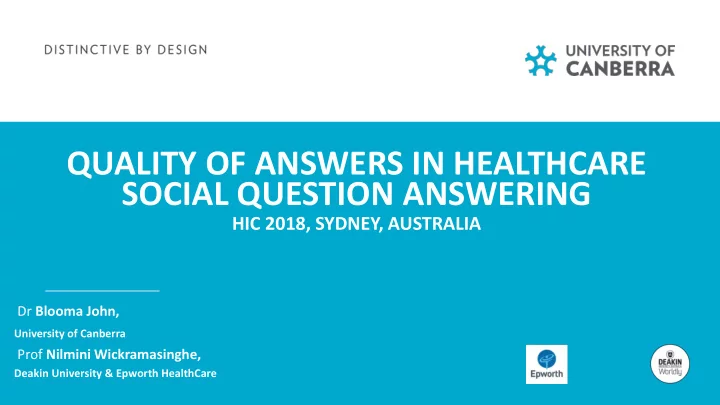

QUALITY OF ANSWERS IN HEALTHCARE SOCIAL QUESTION ANSWERING HIC 2018, SYDNEY, AUSTRALIA Dr Blooma John, University of Canberra Prof Nilmini Wickramasinghe, Deakin University & Epworth HealthCare
Introduction Healthcare Social Question Answering • Users can ask, respond, like and comment • Result in building reusable content
Introduction Healthcare Social Question Answering • Topics include • General health-related information inquiries • Specific information related to physical activities, diet, smoking and alcohol consumption • User can network with others having similar medical conditions
Research Gap Healthcare Social Question Answering • Studies emphasized that modernizations fail to attain feasibility because the is a need to examine the connection between technology and users involved • Social media has empowered people to contribute their knowledge publicly making it available to reuse. • Dangers and threats of imprecise diagnoses are formidable (George et al., 2013) • There is a need to aid in assisting and mining the content shared to make the process of retrieving quality content, relevant to users, easier Research Question: What are the factors that effect the quality of answers shared on SQA services in healthcare social media?
Methodology • A set of features related to questions, answers and users to identify the features that affect the quality of answers (Bian et al. 2009, Agichtein et al. 2008 and Angeletou et al. 2011) Category Features Description Question Number of answers for the Number of answers received question Correctness of the answer Answer Accuracy Number of words per sentence Average number of words per sentence in the answer The Flesch – Kincaid (F – K) The FK reading score indicates the level of reading grade level difficulty in reading Total positive votes Number of positive votes for the answer User User Points Number of points the user received
Methodology • The four distinct sets of entities used for cluster analysis are questions, answers, users and concepts • Collected 625 questions, answers and related features for a preliminary test to identify factors affecting the quality of an answer. • Recruited two health experts to read and evaluate the accuracy of the answers • Accuracy of the answer was rated from 1 to 5 based on the correctness of the answer to the posed question • Analyzed data based on regression analysis
Results Dependent Variable: accuracy Feature Beta t Sig. Number of answers for -.159 -3.831 .000 the question Number of words per -.030 -.680 .497 sentence The Flesch – Kincaid (F – -.058 -1.407 .160 K) reading grade level Total positive votes .044 1.054 .292 User Points -.010 -.235 .814
Results • Accuracy of the answer was dependent on • The number of answers for the question • Reading level of the answer • The total positive votes received by the answer • Length of the answer • The user points • Findings • In social media, answers to health-related question vary with one word to a long story based on the user’s experience • The users who are answering questions are of great diversity • Although the users earn points based on their participation, the users might be very instantaneous • Trust is an important factor in contributing and collaborating
Conclusion By examining the connection between the quality of answers and the question answering process itself, it could help to better understand users’ evaluation behaviors in relation to their preferred answers in health care SQA services Emails: Dr Blooma John - blooma.john@canberra.edu.au Prof Nilmini Wickramasinghe – nilmini.work@gmail.com
Recommend
More recommend